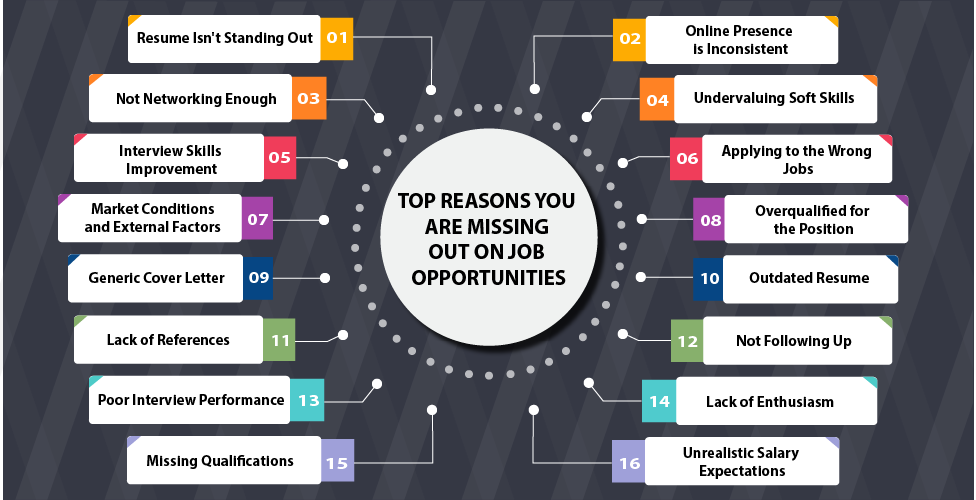Table of Contents
ToggleIntroduction
So far in 2024, the job market has become increasingly challenging. Layoffs have risen, wage growth is slowing, and unemployment has increased to 3.9%. Searching for a job can be an arduous process, especially when your applications don’t result in offers. There are numerous reasons why this might be happening.
Here are 16 common reasons and some tips on how to overcome them.

Don't miss out on your chance to work with the best
Apply for top global job opportunities today!
Top reasons you are missing out on job opportunities

1) Your Resume Isn't Standing Out
- Lack of Customization: Sending out a generic resume to multiple employers can be detrimental. Tailor your resume to highlight the skills and experiences relevant to each specific job.
- Poor Formatting: A cluttered or poorly formatted resume can be hard to read. Ensure your resume is clean, professional, and easy to navigate.
- Missing Keywords: Many companies use Applicant Tracking Systems (ATS) to screen resumes. If your resume lacks the right keywords, it might not even reach a human recruiter.
2) Your Online Presence is Inconsistent
In the digital age, your online presence is almost as important as your resume. Employers often check candidates’ social media profiles and professional networks like LinkedIn.
- Incomplete LinkedIn Profile: Ensure your LinkedIn profile is complete and matches the information on your resume. Highlight your skills, endorsements, and recommendations.
- Unprofessional Content: Inappropriate posts or photos on social media can deter potential employers. Keep your profiles professional and private where necessary.
- Lack of Engagement: Being active in relevant professional groups and discussions can boost your visibility and credibility.
3) You're Not Networking Enough
Networking is a powerful tool in the job search process. Many job opportunities arise through connections rather than job postings.
- Limited Networking: Relying solely on job boards can limit your opportunities. Attend industry events, join professional associations, and reach out to contacts in your field.
- Poor Follow-Up: After networking events or informational interviews, failing to follow up can make you forgettable. A simple thank-you email can make a lasting impression.
Must Read: WHAT ARE THE TOP 10 IN-DEMAND JOBS IN INDIA? 4) You're Undervaluing Soft Skills
While technical skills are crucial, employers also value soft skills such as communication, teamwork, and problem-solving.
- Not Highlighting Soft Skills: Make sure your resume and interview responses demonstrate your soft skills. Use specific examples to illustrate how you’ve used these skills in the past.
- Lack of Self-Awareness: Be prepared to discuss your strengths and weaknesses. Showing self-awareness and a willingness to improve can be attractive to employers.
5) Your Interview Skills Need Improvement
- Lack of Preparation: Research the company, understand the job role, and prepare for common interview questions. Practice your responses to articulate your thoughts clearly and confidently.
- Poor Body Language: Non-verbal cues like eye contact, posture, and handshakes matter. Ensure your body language conveys confidence and enthusiasm.
- Inadequate Follow-Up: Sending a thank-you note after an interview shows appreciation and reiterates your interest in the position
6) You're Applying to the Wrong Jobs
Sometimes, the issue isn’t your qualifications or interview skills but the jobs you’re applying for.
- Overqualified or Underqualified: Applying for jobs that don’t match your skill level can lead to rejections. Ensure the jobs you apply for are aligned with your experience and qualifications.
- Ignoring Job Descriptions: Read job descriptions carefully to understand the requirements and responsibilities. Tailor your application to address how you meet these criteria.
7) Market Conditions and External Factors
External factors beyond your control can also affect your job search.
- Economic Downturns: In times of financial uncertainty, job markets can shrink, making it harder to find opportunities.
- Industry Trends: Some industries experience more growth and hiring than others. Stay informed about industry trends and consider how they might impact your job search.
8) Overqualified for the Position
9) Generic Cover Letter
A generic cover letter can make it seem like you’re not genuinely interested in the job or the company.
Tip: Customize your cover letter for each job application. Mention the company’s name, the specific role you’re applying for, and how your skills and experiences make you a perfect fit.
10) Outdated Resume
An outdated resume can make you seem out of touch with current industry standards and trends.
Tip: Regularly update your resume to reflect your latest experiences, skills, and accomplishments. Use a modern, clean format and include keywords relevant to the job description.
11) Lack of References
Employers often want to speak with previous supervisors or colleagues to get a sense of your work ethic and capabilities.
Tip: Cultivate relationships with past employers and colleagues so you can request references. Always ask for permission before listing someone as a reference.
12) Not Following Up
Failing to follow up after applying or after an interview can make you seem disinterested.
Tip: Send a thank-you email within 24 hours of an interview. If you haven’t heard back after a week or two, follow up politely to inquire about the status of your application.
13) Poor Interview Performance
Even with a strong resume, a poor interview can prevent you from landing a job.
Tip: Prepare for common interview questions, practice your answers, and work on your body language. Research the company thoroughly and come prepared with thoughtful questions.
14) Lack of Enthusiasm
Employers want to hire someone who is excited about the role and the company.
Tip: Show genuine enthusiasm during your interview. Smile, make eye contact, and express your interest in the position and the company.
15) Missing Qualifications
Applying for jobs that you’re not fully qualified for can lead to rejections.
Tip: Focus on applying for jobs where you meet most qualifications. When applying for roles where you’re slightly underqualified, emphasize your willingness to learn and adapt quickly.
16) Unrealistic Salary Expectations
Having salary expectations that are too high can turn off potential employers.
Tip: Research the average salary for the position and industry. Be flexible and willing to negotiate, especially if the role offers other benefits or opportunities for growth.
Read in detail: 12 WAYS TO CALM YOUR JOB INTERVIEW NERVES Conclusion
Securing a job offer involves more than just having the right qualifications. It requires a well-rounded approach that includes a polished resume, a strong online presence, effective networking, and excellent interview skills. Reflect on the areas where you might be falling short and make the necessary adjustments. Persistence is key – keep refining your approach, and you’ll increase your chances of landing the job you desire.
Take control of your career and land your dream job
Sign up with us now and start applying for the best opportunities!

FAQs
Networking is crucial. Many job opportunities are not advertised publicly and are filled through referrals. Attend industry events, join professional associations, and leverage social media platforms like LinkedIn to connect with industry professionals.
Employers often search for candidates online to learn more about them. A professional online presence, particularly on LinkedIn, can enhance your credibility. Ensure your social media profiles are free of inappropriate content and reflect a professional image.
Address your interest in the role in your cover letter. Explain how the position aligns with your career goals and how you plan to bring value to the company despite your advanced qualifications.
Show enthusiasm by researching the company and role thoroughly and mention specific aspects that excite you in your cover letter and interview. Ask insightful questions during the interview to demonstrate your genuine interest.

